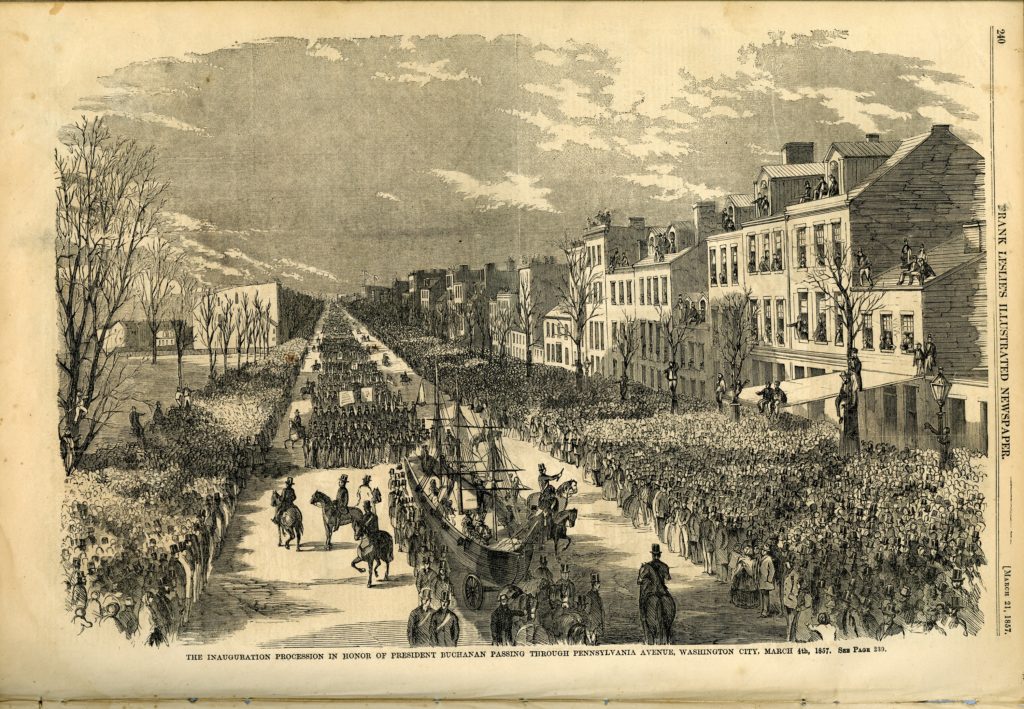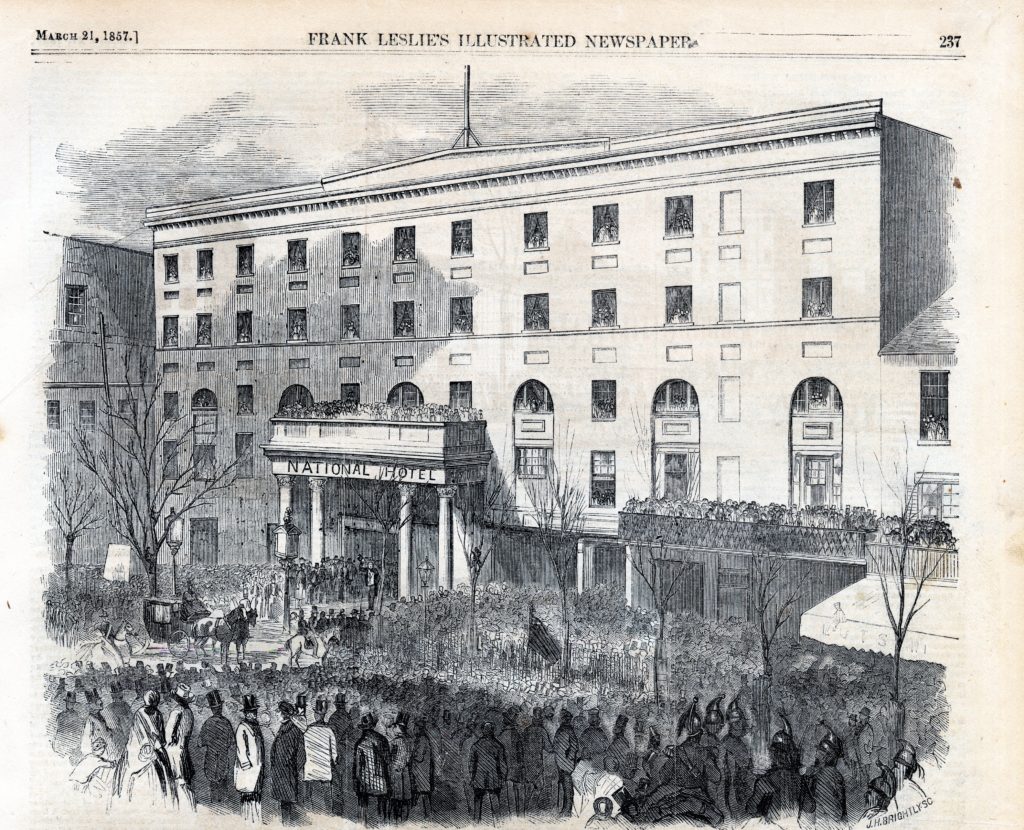The Buchanan Grip
The grand inaugural parade on March 4, 1857 included marching bands, floats, and many elaborate horse-drawn carriages. One particular carriage – in line just behind the one that conveyed President Pierce and President-Elect Buchanan – carried a man few knew even existed: Dr. Jonathan Foltz. Dr. Foltz was there to perform an important duty – keeping a seriously ill James Buchanan on his feet long enough to take the oath of office. As the procession moved along towards the Capitol, Dr. Foltz frequently exited his own carriage and visited the President-Elect’s to “administer remedies” (mostly, this involved dosing an ailing Buchanan with brandy). Dr. Foltz became the first physician to be assigned a bedroom in the White House, and never strayed too far from President Buchanan’s side (presumably with brandy bottle always in hand) during the first months of his term in office.
 “The Grand Inauguration Procession,” Frank Leslie’s Illustrated Newspaper, March 14, 1857 (LancasterHistory.org)
“The Grand Inauguration Procession,” Frank Leslie’s Illustrated Newspaper, March 14, 1857 (LancasterHistory.org)
How did an elected president end up coming to his inauguration with a secret doctor in tow? What caused the mysterious illness that almost killed James Buchanan before he was sworn in?
In Washington, D.C. during the mid-nineteenth century the National Hotel was the place to be. The prestigious hotel once housed notable members of Washington society such as Polk, Lincoln, and Henry Clay (who died there), and their dining room was renowned for its rare wine collection and delightful foods cooked on a cutting-edge gas stove (a manager of the National Hotel applied for a patent for a gas stove in 1855, before most others were using it). Not least of all, the manager of the National Hotel, John Guy, was a native Lancastrian.
 Mr. Buchanan at the National Hotel, Frank Leslie’s Illustrated Newspaper, March 21, 1857 (LancasterHistory.org)
Mr. Buchanan at the National Hotel, Frank Leslie’s Illustrated Newspaper, March 21, 1857 (LancasterHistory.org)
The National Hotel was therefore a natural choice for President-Elect James Buchanan when he was looking for a place to stay in late January 1857. Buchanan had been elected the previous November, and was traveling to Washington to make final preparations to his cabinet appointments ahead of his March 1857 inauguration. Buchanan was traveling with his nephew, Elliot Eskridge Lane, his friend Dr. Jonathan Foltz (the same guy that would be dosing him with “remedies” soon enough), and a group of about 6 other gentlemen. On their first day in Washington, the group dined at their hotel – no doubt enjoying the rich foods and fine wines. By the middle of the night, Buchanan and all but two of his traveling companions were awakened with a violent illness that included diarrhea and vomiting, colic, and typhoid-like fever.
After a few days’ recuperation in bed, attended by friend and fellow sufferer Dr. Foltz who had determined that the bout of illness should be blamed on the soup, the group was well enough to proceed with business and Buchanan returned to Wheatland on February 2. However, the worst had not passed. On February 25, word came from Wheatland that President-Elect Buchanan was no longer admitting visitors. Dr. Foltz became a permanent fixture at Wheatland, and Buchanan was holed away in his bedchamber, presumably close to death. Buchanan had relapsed. It was not the soup.
Buchanan had contracted a mysterious ailment known then as “the Buchanan grip” and today as “National Hotel Disease.” Scholars estimate that 400 or more people contracted this illness from the National Hotel, and perhaps up to three dozen people died from it. One of the disease’s fatalities was Buchanan’s own nephew, Elliot, who died on March 26, 1857. To this day, no one is certain what exactly caused the disease. Some sensationalist newspapers at the time speculated that it was an assassination attempt on President-Elect Buchanan. The prevailing theory is that the disease was caused by the hotel’s primitive sewage system, leading to dysentery.
Although he survived the initial illness, James Buchanan suffered from flare-ups of the dysentery disease for the rest of his life and became seriously immunocompromised. From early 1864 until his death in 1868, Buchanan’s personal physician, Dr. Henry Carpenter, visited him 430 times. During the month of April 1868, Buchanan’s illness culminated in the development of progressive heart failure, and by May a cough had turned into full-blown pneumonia. On June 1, 1868, at the age of 77, James Buchanan passed away at his Wheatland home, surrounded by his family and close friends. His official cause of death was a vague “respiratory insufficiency,” but there is little doubt that the National Hotel Disease contributed to his passing.
This is an entry from History from the House:
A 200-year-old house once occupied by an American president has a lot of stories to tell. From an office in Wheatland’s former kitchen space, Museum Educator Stephanie Townrow digs up quirky, fascinating, and sometimes puzzling stories that reveal the hidden histories within President James Buchanan’s Wheatland. She invites readers to explore his home, meet his “little family,” and learn about the tumultuous political climate that surrounded his presidency.
From History From The House